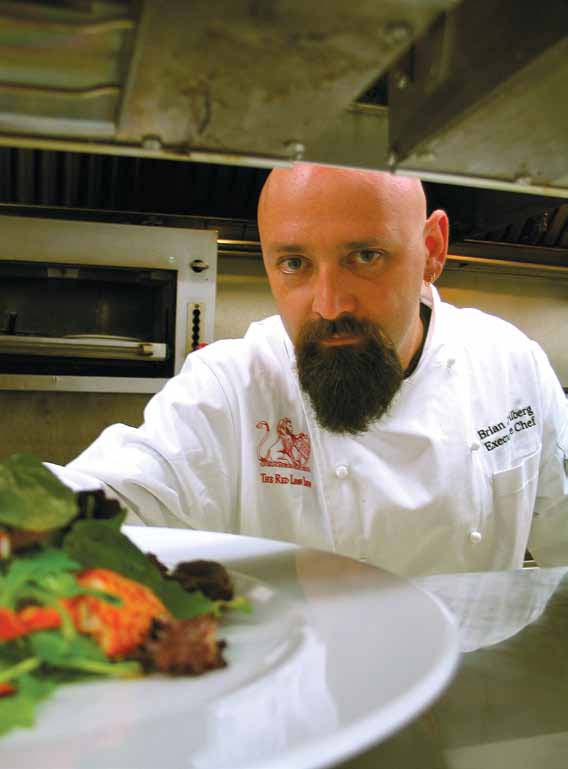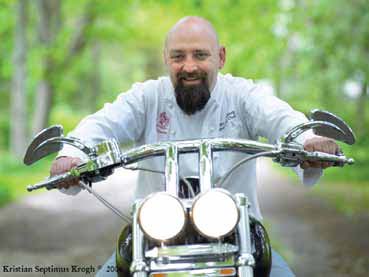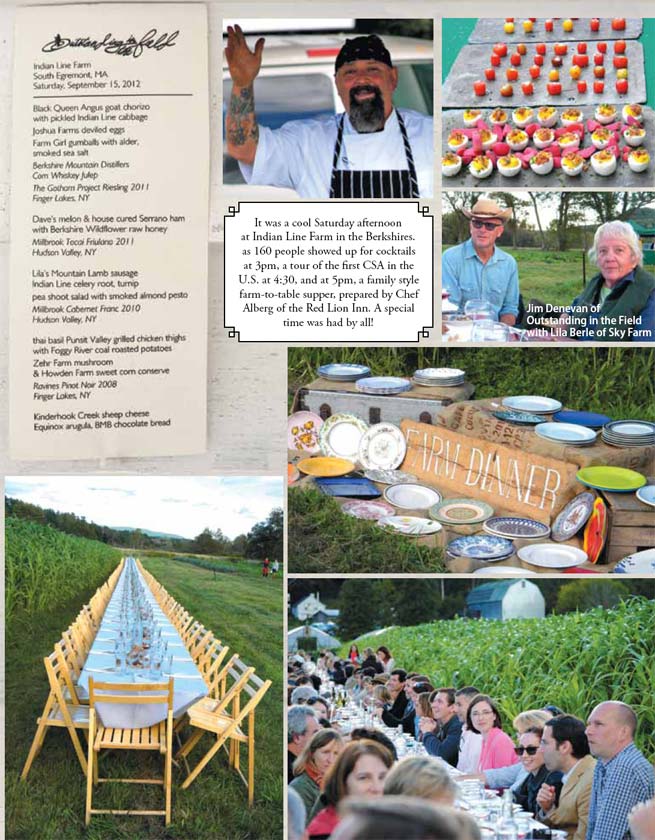Chef Brian Alberg’s mission is to spread his love of food

Photos courtesy of The Red Lion Inn
Six years ago Chef Brian Alberg had a flashback to his teenage years. He was working a dinner for the Railroad Street Youth Project, a Great Barrington–based program designed to mentor and empower Southern Berkshire County youth aged 14 to 25.
Standing in the kitchen, he watched with recognition as the enthusiastic young people hurriedly worked the line, helping everything run smoothly from chef to waiter.
To Alberg, executive chef and director of food and beverage at the Red Lion Inn, each youth stood as a reflection of himself at 14, when he apprenticed under the late Jean Morel, chef and owner of the former l’Hostelliere Bressane in Hillsdale, NY.
“Jean Morel instilled within me all of the values that I still hold today, and working with those kids that night reminded me that I could give back and help our industry nurture new minds,” says Alberg, now 45 and the father of three.
It’s an industry that Alberg loves, with all of its hectic schedules and occasional unpredictability. Right now, he’s in the middle of the fall season, when the venerable Stockbridge inn moves from its busy summer to leaf-peeper season, which extends from September through November.
“Autumn really is my favorite season,” Alberg says. “It has my type of food, the weather’s better, there’s that smell in the air—it’s what New England is all about, it’s the best.”
While he routinely works 12-hour days, starting by eight in the morning and ending around eight at night, in the fall Alberg spends less time in the kitchen and more time working outside. Fall finds Alberg walking through local farmers’ fields in search of the best produce for the Red Lion’s kitchen, collecting and shucking over 1,000 ears of corn for the annual end-of-September corn harvest and ending with Thanksgiving, when 150 turkeys will be roasted at the Inn. It’s a season with activities as varied and diverse as Alberg’s menus.
“These menus aren’t stale or pre-planned. I always create a new menu, and I can include anything from braised short rib, to a meal using pork—it’s always different. It all depends on the mood I’m in,” he says. “That’s the cool thing about food: There are always so many options.”
Those options are changing with some outside environmental forces that are out of his control. Alberg says that recent climate changes impacting all of New England have shifted the growing seasons for local farmers. In recent years, the traditional summer growing season has extended into October and parts of November, which requires Alberg to do two major menu changes—a late-summer menu that starts at the beginning of September, and then a fall and winter menu that starts in November.
“We still have tomatoes in a time of year when we wouldn’t normally have them,” he says. “Right now, it looks a lot like our summer menu, but there are of course some adjustments to our vegetables and cooking techniques.”
Part of what defines fall in the Red Lion kitchen is using ingredients that others wouldn’t normally think to use. Alberg likes to always include at least one weed or invasive plant, such as Japanese knotweed, or thistles and lentils.
“To surprise people with something different, to impart a lasting impression on someone through food, is such a great feeling,” he says. “It’s one of the great parts of this life.”
Finding his calling
The life of a chef is what Alberg has wanted since he was a teenager. He grew up in the small town of Copake, NY, in nearby Columbia County, and his favorite childhood memories involve food. Whether cooking with his mother, enjoying a German picnic at the local Elks Club with his grandparents or looking forward to his father’s pig roasts in the backyard, Alberg says those moments stay with him.
After spending two years with Morel, Alberg earned early acceptance at the Culinary Institute of America in New York, enrolling at age 17 and graduating by 19. And it was during that time that he got his first taste of the Red Lion. He used to sneak into the Lion’s Den, the Inn’s downstairs pub, when he was 18—right around the time the state’s legal drinking age had shifted up to 21, he says.
After graduating from the CIA, Alberg worked as a sous-chef at the New Yorker Restaurant in Millertown, NY, before working his way up the restaurant circuit in the region. Eventually, he made the move out of the Berkshires to work as executive chef of Dudley’s in Westchester, NY, in 1993. His next move led him to the Saybrook Inn and Spa in Old Saybrook, CT, where he was executive chef and director of food and beverage.
A series of changes would bring him back to the Berkshires—after eight years at the Inn, a stint in the corporate world working for Marriott and a divorce from his first wife, Alberg decided to return to the Berkshires to be closer to his children, leading him to the Red Lion in 2004.
Creating ‘something beautiful’
On a superficial level, Alberg and the Red Lion are something of an odd couple. With its storied history and rather austere image, the 18th century inn is a local icon—a haven for out-of-towners in the Berkshires and the longtime local residents who have found a second home among the building’s inviting porch and plush seating. Alberg has a decidedly different image. With tattoos, piercings and a love of motorcycles, Alberg might not be the most likely face of a quintessentially New England inn, but he has nevertheless become synonymous with the Red Lion’s sterling reputation beyond the Berkshires. He is a member of the James Beard Foundation, a national nonprofit that promotes the nation’s culinary heritage, and this past February, he won the Best Overall Dish prize at the third annual American Lamb Jam in Boston, sponsored by the American Lamb Board.
He has also made quite a name for himself within the Berkshires. Not only is he on the board of the Railroad Street Youth Project, but Alberg also serves as president of Berkshire Grown, a nonprofit that supports local farmers and aims to strengthen relationships among area farms and restaurants. Since taking on the Red Lion chef ’s hat eight years ago, Alberg has ensured that all produce used by the Inn comes from local farmers.
“He really is pioneering and strengthening the network between farmers and chef, which is so important,” says Barbara Zheutlin, executive director of Berkshire Grown.
Zheutlin has known Alberg for five years through their work with the nonprofit, and says she is often inspired by his passionate support of locally grown food.
“As a chef, Brian provides and promotes local food to a wide variety of visitors who come to the Berkshires by feeding them delicious, sustainably grown food,” she says. “He is just so energetic and deeply committed to getting things done, and making a difference.”
It’s all about spreading his love of food to others. And it runs in the family. While Alberg’s oldest child, a daughter, is now a freshman at the Fashion Institute of Technology, and his youngest is only 3 years old, his 19-year-old son, Brendan, is following in his father’s footsteps: He works as a line cook at the Red Lion.
What are some of the lessons he hopes to impart to his son? Number one would be work ethic, certainly. The second is something he learned from Morel, back at the beginning.
“He taught me to care for the ingredients,” Alberg says. “Don’t manhandle things. Treat it with respect, whether it’s a vegetable, beet, sweetbread, anything—don’t damage it, but instead care for it, cook it properly, clean it properly and, if it’s an animal, don’t just discard things that you don’t typically use or sell.”
“You can pick up on people that don’t care,” he adds. It’s the fact that he cares so much that makes Alberg stand out, says Ananda Timpane, executive director of the Railroad Street Youth Project.
“He’s just a really good citizen who really commits to being part of and giving back to the community,” Timpane says, adding that his dedication to educate the next generation of chefs is especially inspiring to be around.
From Copake to Stockbridge, complete with the daily grind of those endless shifts, it’s been an interesting journey for Alberg, a man who says he would pursue woodworking if he wasn’t a chef. He even builds furniture whenever he can find some spare time.
“It’s the calming aspect of woodworking that I like,” he says. “I like to take a raw product and turn it into something beautiful. You don’t eat it, but you live with it and appreciate it. I like making things that others will appreciate.








